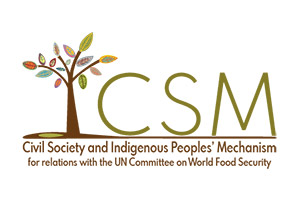First, the CSM is not in the position at this moment to announce its formal position on the final document. We request that this can be duly reflected in the final report of this plenary session, as it was done for the final report of the 47th session vis-à-vis the Voluntary Guidelines on Food Systems and Nutrition.
The CSM is composed of a wide range of constituencies. For all of them agroecology is at the core of their daily work, life, as well as the vision of framing a sustainable and human rights-centered food system.
The text was made available in all languages just a couple of days before this Plenary, and many of our CSM participating organisations have not had sufficient time to look at the document in their language nor have a proper discussion within their respective governing bodies, which is a necessary step in their democratic governance processes for reaching a final collective decision.
In addition, more time is needed to look at the document in its entirety and assess the extent to which it can deliver on the baseline priorities that we announced publicly on many occasions, before and during the negotiation process.
Nevertheless, we would like to share some preliminary remarks to contribute to the discussion today.
We would like to acknowledge the changed environment that has characterised this negotiation process. We acknowledge the commitment of the Rapporteur to strive for a more inclusive and participatory negotiation and the effort to secure as much time as possible despite the incredible time pressure.
However, we also reiterate that time was a problem that we had the means and the possibility to overcome. CSM offered a variety of options that most of the Governments didn’t want to consider. We have to acknowledge that the time pressure limited much of the ability and need to have a much longer and serious discussion on many aspects of the recommendations. Had we had this time, it would probably have led to a more satisfactory outcome. Compromise is part of the negotiation, but all too often this compromise was forced by time constraints and not a proper consensus-building process, despite the great patience and wise management of the Rapporteur.
We ended up having sessions without interpretation. This was a structural and severe barrier hindering the participation of many of our social movement’s delegates. This was added to the already well-known limitations that the virtual modality brings to such a process, with social movements challenged by connectivity problems, time zone differences as well serious difficulties in following the text changes on a screen and only in English.
Despite all these limitations, we wish to again thank the Rapporteur for his effort in making this negotiation more inclusive and respectful of the CSM than the negotiations process on the voluntary guidelines on food systems and nutrition. We would also like to thank the technical team for their continued advice and support, and acknowledge the role played by some MS in some critical moments in facilitating a consensus on the importance of agroecological transition.
Regarding the content, we acknowledge the fact that the some of the recommendations highlight some critical important elements of agroecology, as embedded in the ten elements of the FAO as well as in the HLPE report.
However, we must highlight how we proposed this process in the first place and it was transformed into an impossible proposition where AE is combined with the exactly opposite approaches, forcing a combined discourse. The HLPE addressed such a complex request and offered a policy assessment framework which was completely ignored, while the ancestral and traditional knowledge of indigenous peoples and communities was repeatedly marginalized in the name of science and evidence-based policies.
We had to devote a significant part of our efforts to damage control. It worked in some cases, though the result is that the resulting recommendations do not provide retrogression but neither generate advancement.
We are confused and profoundly disappointed to notice that we had to struggle for language on human rights, women’s rights and the rights of peasant and people working in rural areas present in the CFS texts. The CFS was reformed with the mandate to achieve the progressive realization of the right to food and it is absolutely unacceptable to us that the CFS fails to assume the interconnection of the right to food with the rights of women and of those who produce most of the food. This is the space where these rights should be celebrated and where these rights should inform all CFS policy outcomes. The fact that this is not happening is of serious concern, both now and for the future of the CFS.
Last but not least, there are some points in the recommendations that are completely and inherently contradictory with agroecology – such as the use of chemical fertilisers and pesticides to mention just one.
Agroecology is a way out from dependence on external inputs. The fact that these recommendations encourage optimisation of the use and risk of pesticides undermines not only our goals and advocacy efforts, the health, livelihoods and survival concerns of peasant and family farmers, Indigenous Peoples, agricultural workers, and other small-scale food producers that have practiced agroecology for centuries, but also contradicts existing UN agreements, policy frameworks and agreed guidelines regarding pesticides and chemicals management. Furthermore, it blocks the aspirations we heard from a number of member states to transition fully to agroecology, moving away from the harmful chemical dependencies that interfere with human rights to a healthy environment and healthy ecosystems.
The CSM reiterates its commitment and constructive attitude towards the CFS, and towards the process for assessing CFS policy recommendations, and we commit to sharing the result of our analysis as soon as and when we have completed it with you.


